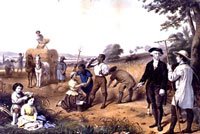
But Im willing to let ol' George Washington have the benefit of the doubt. Check out this article from the GW Estate:
George Washington was born into a world in which slavery was accepted. He became a slave owner when his father died in 1743. At the age of eleven, he inherited ten slaves and 500 acres of land. When he began farming Mount Vernon eleven years later, at the age of 22, he had a work force of about 36 slaves. With his marriage to Martha Custis in 1759, 20 of her slaves came to Mount Vernon. After their marriage, Washington purchased even more slaves. The slave population also increased because the slaves were marrying and raising their own families. By 1799, when George Washington died, there were 316 slaves living on the estate.
The skilled and manual labor needed to run Mount Vernon was largely provided by slaves. Many of the working slaves were trained in crafts such as milling, coopering, blacksmithing, carpentry,and shoemaking. The others worked as house servants, boatmen, coachmen or field hands. Some female slaves were also taught skills, particularly spinning, weaving and sewing, while others worked as house servants or in the laundry, the dairy, or the kitchen. Many female slaves also worked in the fields. Almost three-quarters of the 184 working slaves at Mount Vernon worked in the fields, and of those, about 60% were women.
The workday for slaves was from sun-up to sun-down, six days a week. Sunday was a day of rest.
Although George Washington was born into a world where slavery was accepted, his attitude toward slavery changed as he grew older. During the Revolution, as he and fellow patriots strove for liberty, Washington became increasingly conscious of the contradiction between this struggle and the system of slavery. By the time of his presidency, he seems to have believed that slavery was wrong and against the principles of the new nation.
As President, Washington did not lead a public fight against slavery, however, because he believed it would tear the new nation apart. Abolition had many opponents, especially in the South. Washington seems to have feared that if he took such a public stand, the southern states would withdraw from the Union (something they would do seventy years later, leading to the Civil War). He had worked too hard to build the country to risk tearing it apart.
Privately, however, Washington could -- and did -- lead by example. In his will, he arranged for all of the slaves he owned to be freed after the death of his wife, Martha. He also left instructions for the continued care and education of some of his former slaves, support and training for all of the children until they came of age, and continuing support for the elderly.
Plus: Who is WEB Dubois?


No comments:
Post a Comment